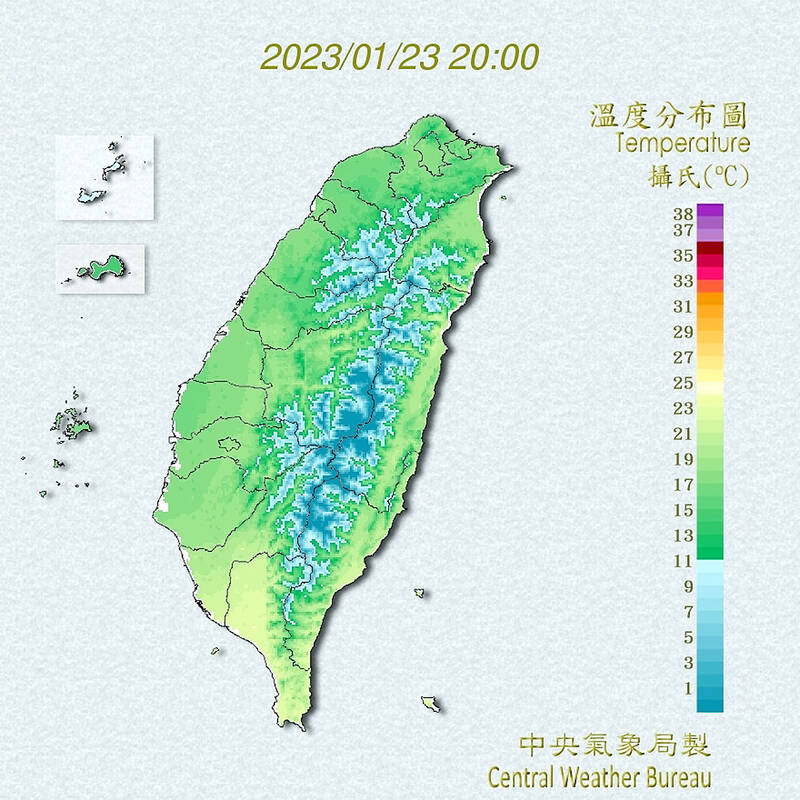The Central Weather Bureau has issued cold weather warnings as the arrival of a cold front last night is expected to drive temperatures as low as 6°C over the coming days.
The bureau yesterday issued an “orange” warning for New Taipei City, Keelung and Taoyuan, as well as Hsinchu, Miaoli and Yilan counties, adding that Taipei and Taichung might see temperatures at or below 10°C.
Under the bureau’s three-color cold weather advisories, an “orange” warning signifies “very cold” weather, with a minimum ground-level temperature of below 6°C, or a minimum ground-level temperature of below 10°C, with the temperature remaining below 12°C for 24 hours.

Photo: Screen grab from the Central Weather Bureau
The bureau also issued a “yellow” warning for Tainan, Hsinchu and Chiayi cities, and Changhua, Nantou, Yunlin, Hualien, Taitung and Kinmen counties.
A “yellow” warning denotes “cold” weather with minimum ground-level temperature below 10°C, along with a significant day-night temperature differential.
A “red” warning, the highest alert, indicates “extremely cold” weather, with the temperature remaining below 6°C for 24 hours.
Temperatures are forecast to fall to their lowest level today and tomorrow in the northern two-thirds of Taiwan, dipping to 7°C to 10°C, with coastal and open areas experiencing even colder temperatures, bureau forecaster Chang Cheng-chuan (張承傳) said.
Meanwhile, temperatures in southern and southeastern Taiwan could see lows of 11°C to 13°C, he said.
Snowfall is possible at altitudes of at least 3,000m in the east and potentially as low as 2,000m on mountains in northern, northeastern and central Taiwan, where temperatures would be colder, he said.
The mercury is expected to rebound on Thursday as the cold snap weakens, before the arrival of another cold air mass on Friday brings temperatures down again, likely through Sunday, Chang said.

‘TAIWAN-FRIENDLY’: The last time the Web site fact sheet removed the lines on the US not supporting Taiwanese independence was during the Biden administration in 2022 The US Department of State has removed a statement on its Web site that it does not support Taiwanese independence, among changes that the Taiwanese government praised yesterday as supporting Taiwan. The Taiwan-US relations fact sheet, produced by the department’s Bureau of East Asian and Pacific Affairs, previously stated that the US opposes “any unilateral changes to the status quo from either side; we do not support Taiwan independence; and we expect cross-strait differences to be resolved by peaceful means.” In the updated version published on Thursday, the line stating that the US does not support Taiwanese independence had been removed. The updated

‘CORRECT IDENTIFICATION’: Beginning in May, Taiwanese married to Japanese can register their home country as Taiwan in their spouse’s family record, ‘Nikkei Asia’ said The government yesterday thanked Japan for revising rules that would allow Taiwanese nationals married to Japanese citizens to list their home country as “Taiwan” in the official family record database. At present, Taiwanese have to select “China.” Minister of Foreign Affairs Lin Chia-lung (林佳龍) said the new rule, set to be implemented in May, would now “correctly” identify Taiwanese in Japan and help protect their rights, the Ministry of Foreign Affairs said in a statement. The statement was released after Nikkei Asia reported the new policy earlier yesterday. The name and nationality of a non-Japanese person marrying a Japanese national is added to the

AT RISK: The council reiterated that people should seriously consider the necessity of visiting China, after Beijing passed 22 guidelines to punish ‘die-hard’ separatists The Mainland Affairs Council (MAC) has since Jan. 1 last year received 65 petitions regarding Taiwanese who were interrogated or detained in China, MAC Minister Chiu Chui-cheng (邱垂正) said yesterday. Fifty-two either went missing or had their personal freedoms restricted, with some put in criminal detention, while 13 were interrogated and temporarily detained, he said in a radio interview. On June 21 last year, China announced 22 guidelines to punish “die-hard Taiwanese independence separatists,” allowing Chinese courts to try people in absentia. The guidelines are uncivilized and inhumane, allowing Beijing to seize assets and issue the death penalty, with no regard for potential

There is no need for one country to control the semiconductor industry, which is complex and needs a division of labor, Taiwan’s top technology official said yesterday after US President Donald Trump criticized the nation’s chip dominance. Trump repeated claims on Thursday that Taiwan had taken the industry and he wanted it back in the US, saying he aimed to restore US chip manufacturing. National Science and Technology Council Minister Wu Cheng-wen (吳誠文) did not name Trump in a Facebook post, but referred to President William Lai’s (賴清德) comments on Friday that Taiwan would be a reliable partner in the